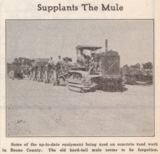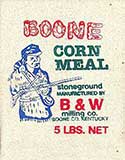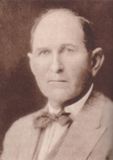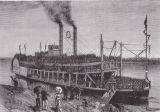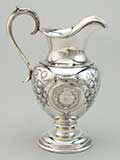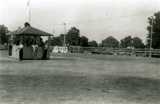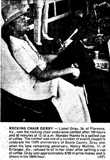
Image of Boone from a painting by J. W. Berry
Boone County was formed from a part of Campbell County in 1799. It was the 30th county to be formed in Kentucky, and is named for, uh, Daniel Boone. (You knew that, right?) More info? Google lists about 1,390,000 or so mentions for Dan'l, here, or, you can read his bio. We recommend Daniel Boone: The Life and Legend of an American Pioneer by John Mack Faragher |

![]()
Boone County was the 35th county formed in Kentucky. The law enacting Boone County was passed on December 13, 1798. The county was formed on June 1, 1799 from Campbell County. Its boundaries are unchanged since March 10, 1870. It has an area of 246.2 square miles, making it the 87th largest of Kentucky's 120 counties. It's undergone these boundary changes. Read about the 1837 boundary change here. |
Discover the highest point in the county.
![]()
Chicago's Newberry Library has posted online a complete set of maps of American counties formations. They start with the date of county formation, and trace every little change to the boundaries after that. Boone County has had 3 such changes, and you can see Boone maps here (pdf). To see the counties from which the county was formed, you'll have to download the entire Kentucky state pdf. There's also a feature that you can use to import all this data into Google maps. Good stuff! |
![]()
| The Boone County Recorder has published two Historical Editions, with pictures, biographies, histories and more. Each is the proverbial treasure trove of Boone County history. You can read both right here. Each is a pdf. | |
| 1903 | 1930 |
![]()
|
In 1876, the R. L. Polk Company published The Kentucky State Gazetteer and Business Directory, which listed information about virtually every town in Kentucky. The listings from Boone County are these: |
||||
Grant (Belleview) |
||||
![]()
A later Polk Gazetteer, from 1883-84, lists these Boone County communities: |
||||||
![]()
| A later, 1895 Gazetteer adds: | An earlier, pre-Civil War Gazetteer from 1859 lists details on only these three Boone County locations: | |||
| Richwood | Limaburg | Florence | Beaver Lick | Rabbit Hash |
The 1878 Biographical Encyclopedia of Kentucky |
||
| Memberships Lists of the Masonic Lodges of 1890 in these Boone County locations are here: | |||||
| Belleview | Burlington | Florence | Hamilton | Union | Petersburg |
![]()
| Memberships Lists of the Masonic Lodges of 1911 in these Boone County locations are here: (pdf's) | |||||
| Big Bone | Belleview | Burlington | Hebron | Union | Walton |
For membership rolls of ALL Masonic Lodges in ALL cities in Kentucky,
from 1878 thru 1922, search the Hathi Trust Digital Library, by individual year.
![]()
G. W. Hawes' 1861 Commercial Gazetteer and Business Directory of the Ohio River gives these descriptions of Boone County's Ohio River towns.
Who's who in Boone County, in 1840.
![]()
The Boone County Historical Society's web site is here.
“That we have too many pistols engaged in adjusting disputes in the country, and especially in this county, is a deplorable fact, which is attested to by the frequent display of these peace makers (?), if not by bringing them into use also.” The Boone County Recorder, February 22, 1898 |
“It will be remembered that about ten years ago [March 28, 1859], the steamers Nat. Holmes and David Gibson, the one ascending and the other descending the Ohio river, collided a short distance above Aurora. The Holmes was a complete wreck, many lives were lost, and a large amount of property were destroyed.” from Lawrenceburg, Indiana's The Register, May 28, 1868. |
 |
 |
 |
| Winfield Cottage at Piatt's Landing. Piatt's Landing is now part of the East Bend Power Plant. This was the Robert Piatt home. | The Jacob Piatt home, Federal Hall, above the river, north of Petersburg. It burned down in the 1970's. | The Benjamin Piatt Fowler House on old 42 in Union. This 1970 drawing is by Linda Hughes |
| “Jacob Wykoff Piatt, a distinguished member of the Hamilton county Bar, died at his residence in Boone county, Kentucky, on Thursday evening last. Mr. Piatt was born in the year 1800, in the same house in which he died - a fine old stone mansion on the banks of the Ohio, nearly opposite the mouth of the Miami, built by his grandfather, and one of the first residences erected in Kentucky.” Daily State Sentinel, Indianapolis, June 8, 1857 | ||
| The two remaining Piatt Houses are both on the National Register of Historic Places. The applications, containing photo's, maps, history, and architectural details: B. P. Piatt House, and Piatt's Landing. | ||
| In 1900, John James Piatt edited and published a book of various pieces he called The Hesperian Tree: An Annual of the Ohio Valley - 1900. The entire text is online at Google Books, here. | The back pages of the book at the left feature advertisements with blurbs from reviews that say very nice things about Mr. Piatt's and Mrs. Piatt's poetry. The blurbs had a higher opinion of it than we do. |
| A couple of items from Piatt's book deal with Northern Kentucky history. The first is a chapter John Uri Lloyd wrote for, but did not include, in his Stringtown on the Pike. It’s about two tramps walking down the Ohio River on the Indiana shore, and the dialogue between them. One explains to the other features and facts about the Kentucky side of the river. It’s a pdf, and you can read it here. | The second is a series of four short pieces by Kenneth Lake: one lamenting the loss of the ability to whip slaves at the whipping post, a feud between two men, the wonderful saga of the Petersburg Racing Association, and last but not least an account of fox hunting in Boone County. It’s a pdf also, and it’s here. |
| “Three slaves, two men and a woman, belonging to Mr. Piatt, who lives in Kentucky, just across the river from our city, ran away from their owner on Tuesday night of last week. They got as far up in Ohio as Bellefontaine, where they were recognized and arrested by a brother of Mr. Piatt, at whose house they had stopped to get something to eat. A dispatch, stating the arrest, having reached the owner of the slaves, he started, accompanied by five men, for Bellefontaine, but got there in time to be too late to get his property. The abolitionists had taken them by force and sent them on their way, and Mr. P. had to return without their desirable company.” the Independent Press of Lawrenceburg, Indiana, November 10, 1852 | “We understand that Mr. A. S. Piatt is about to commence a suit against the Little Miami Railroad Co. to recover the value of slaves that recently escaped from his estate in Kentucky.” the Independent Press of Lawrenceburg, Indiana, December 1, 1859. |
| A resident of St. Louis rambles on in 1881 about his old days in Boone County, with some paragraphs about the Piatt's. |
| The Cincinnati Auto Club outlines Auto Jaunt #12, a 1907 guide for going to Walton and back. |

Rising Sun Times, 1837
![]()
Confederate John Hunt Morgan (Wikipedia) escaped his Columbus, Ohio prison in 1863
and came south thru Cincinnati, to Ludlow, and into Boone County.
Boone County items from Collin's History of Kentucky.
The Kentucky Highway Department is proud of upgrading from
mules to mechanization in this 1923 Boone County image.
The 1949 34th District Basketball Teams, in the days before high schools consolidated, featured the Florence Knights, the New Haven Tigers, The Hebron Cardinals, the St. Henry Crusaders, the Burlington Eagles and the Lloyd Juggernauts
![]()
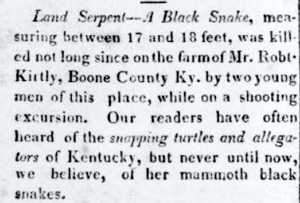
Indiana Palladium, April 21, 1827
The Most Startling Amusement on the Terrestrial Globe!!!
And it's coming to Walton and Burlington.
Trotting horses and their breeding was serious business in Boone County in the 1870's. An article on the outcome of the Northern Kentucky Trotting Association Meet in Florence is here. And this article lists the six - that's 6 - trotting tracks in Boone County in 1870. |
|
Wild game scarce in Boone County in 1894.
![]()
| Rev. John Peck, Cazenovia, New York reports on evangelical doings in Gallatin and Boone in 1818, here. | |
| When the Presbyterians in Philadelphia sent out missionaries, in 1811, where did they send them? Boone County. | And yet, by 1814, it doesn't seem like the missionaries had much of an effect. Here. |
| A preacher on a temperance mission in 1833 visits several towns in Boone County, goes through Gallatin and ends up in Ghent and Port William (Carrolton). He's generally appalled by the drunkenness he encounters. | |
| Although by 1824, the Baptists are reported to be doing better. | Boone County Recorder takes a quick census of Baptist membership in the county. |
New Roads, aerials of the I-75 interchanges under construction, July 13. 1960
From a Facebook post by George Smed
![]()
The Kentucky Libraries Unbound web site has a bunch of oral interviews with Boone Countians.
A 1909 bird watcher lists all of the birds and animals you might expect to see in Boone County.
![]()
The stage coach from Lawrenceburg, through
Burlington and Florence to Cincinnati. In 1835.
Rising Sun Times, 1835
![]()
Boone farmers agree to grow no tobacco in 1908. A letter to the Boone County Recorder urges farmers to cut out the 1908 crop. The ban is enforced one night in Richwood, and another time in Hathaway. Why? All because of the Kentucky Tobacco Wars c. 1908. |
| Walton tobacco warehouse burns in the 1908 Tobacco Wars. |
![]()
| Boone Countians re-think support for Andrew Jackson, here. | Did you know Robert E Lee's birthday used to be a legal holiday in Kentucky? Not all that long ago.... | Historical Spots in Boone County, here. |
| 1914, the Louisville Auto Club published directions on how to get to Cincinnati, via Georgetown. Note the number of times where the road crosses the railroad. Fair grounds in Richwood?? | Big government steps in and refuses to let you run your livestock freely in the county. | |
| 18 year old Malie said no, but her 17 year old sister Annie had a different idea altogether. It's a story of true love (not!), here. | The Boone County Recorder reports on Christmas doings in several towns in Boone in 1877. | The 1930 Boone County Recorder Historical Edition had this synopsis of Boone County. |
| As part of Boone County's celebration of its 175th Anniversary, they issued a book (pdf) on the county's history. | ||
| The Concise Statement of the Trial and Confession of William Clutter, who was Executed on Friday the 8th of June, 1810, at Boone Court-House, Kentucky, for the Murder of John Farmer (pdf) | ||
| The Huey's of Boone County. | Lawyers of Boone County, 1872, here. | The Boone County Gold Rush, here. |
| Jack Rouse wrote this history of Boone County Volunteer Fire Departments, including mostly Walton, but also Burlington, Point Pleasant, Petersburg, Burlington and Hebron. | The Kentucky Arsenal would like back the guns they lent to a Boone County man. | Boone County Schools vote to integrate. |
Cave Johnson came to Kentucky in 1779, and died at North Bend in 1850. The Boone County Recorder published some of his reminiscences, and those can be read here (pdf). Judge Anthony Frohlich has written this bio of Johnson. |
Most states track the largest tree of each species in the state. Kentucky's list is at this site, and you'll find Boone Co has the largest Red Buckeye, and the largest Northern Red Oak in the state. |
The steamer General Pike was charged with distributing relief supplies at the height of the 1884 flood. Read about it’s stop in Bromley, Constance, Stringtown, and Taylorsport here. |
| In 1937 UK released surveys of known archaeological sites by county. Boone County’s is here. (pdf) | The 1907 flood in Boone County. | |
| “At a celebration of a Baptist Association in Louisville, the Rev. J. A. Kirtley, of the North District Association, was called to the front and received recognition of having been part or of the church at Bullitsburg thirty-one years and of the Big Bone Church for thirty-five years. Dr. T. E. Eton said that it was ‘remarkable for a man to serve one church for thirty one years and another for thirty-five years and yet the churches did not kill the pastor, nor the pastor the churches.’” J. H. Spencer, in his A History of Kentucky Baptists | Boone County farmers want to know when “they may expect their homes ruthlessly invaded by unfeeling monopolists.” More here. | |
| Early Indian attacks in Boone County. | Changes in the mail routes, 1835. | The Kate Conn episode, 1879. |
| In 1906, the Courier-Journal published a list of out-of-state residents who would come home to Boone County. | For the Petersburg and Burlington Turnpike, in 1876, there were established rules. | Kentucky writer avoids paying off a promise. |
| A traction line is going to be built from Erlanger to Petersburg. Wikipedia describes traction lines. | History of Boone County from Collins' History of Kentucky. (pdf) | Boone County man makes a claim on the $20,000,000 estate of Wm. Penn. |
| Boone County's time keeper, Renaissances man was Thomas Zane Roberts. A brief bio is at the Boone County Library, or you can read a review of Judge Tony Frolich's book about the man. | ||
| A new road is proposed in 1827 between Lawrenceburg, Indiana and the Georgetown-Cincinnati Turnpike, thru Burlington. | It's 1921, and they're planning Big Doings for the opening of the Dixie Highway between Erlanger and Florence. | In 1837 the Legislature authorized a toll road from Covington to Burlington. |
| The Cincinnati Commercial reported, on January 30, 1869, there were 21 doctors practicing in Boone County. | ||
| Ellis Cummins Crawford (of Behringer-Crawford fame) wrote about the Rogers Site, an Indian Mound Excavation, between Petersburg and Grant. It's here. (pdf) | In 1930, Kentucky Progress Magazine ran a feature letting each of Kentucky's counties list their accomplishments for 1929. What Boone County came up with is here. (pdf) | The Kentucky Department of Agriculture's assessment of agriculture in Boone County, in 1898-1899 can be found here. (pdf) |
A 1933 plan to merge Boone, Gallatin and Carroll.
![]()
| History of Boone County newspapers. |  Cincinnati Daily Gazette, August 29, 1860 |
An early newspaper, published by the Lutheran Churches of Boone County, was the Boone County Banner. It's on microfilm at UK, or in the libraries in Covington or Limaburg. Over the Banner's several year run, c. 1896-1899, it published the history of Lutherans in Boone County. It's in 24 parts, over that many issues, and is WAY more than we ever want to read, let alone type, but if you're interested . . . It also has a lot of Boone County school news. And at least one complaint per issue about the muddy state of the roads in Boone County. |
|
Another early Boone County newspaper was the Boone Journal.

Covington's Daily Commonwealth, December 11, 1882
![]()
A flour bag. We know nothing about when, or where in the county
![]()
UK excavated a number of Adena Culture era (c.
1000 - 200 BC) mound around 1940. Boone County has more of these sites than most counties in the Adena area. |
||
 |
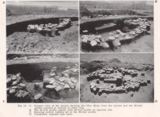 |
|
| The Crigler Mounds are on top of the hill between Taylorsport and Constance |
The Hartman Mound is three miles northeast of Petersburg, overlooking Lawrenceburg. |
|
 |
 |
|
| The Robbins Mounds are 2 miles northeast of Big Bone |
A second view of the Robbins Mounds, about 2 miles nw of Big Bone |
|
Wm. S. Webb and John B. Elliott were in charge of the Robbins mound, above. Their conclusions, published by UK in 1942, are here (pdf). |
||
 |
 |

|
| The Riley Mounds were 7 miles southwest of Union |
Map Showing Ft. Ancient Sites in Boone Co. |
|
![]()
| Prof. A. M. Yealey was a prolific writer of Boone County History, and published booklets, and frequent newspaper columns in both the Boone County Recorder and the Walton Advertiser. Here are a bunch of them. We're pretty sure we've missed some. For more on Yealey, James Duvall has written this bio (pdf) of Professor Yealey. |  |
![]()
A 1976 Bicentennial Souvenir newspaper published a page on each county in Kentucky. Here's Boone's.
![]()
|
Incidents like the following were common in the period, as people rebelled against privately owned turnpikes, which were almost always
poorly maintained: “Covington, Ky., July 13. – The pattering of hoofs of fleet-footed horses bearing masked riders awakened the farmers near Constance, Ky. The toll gates at Idlewild on the Burlington road and at the Bullitsville and Dry Creek pike were destroyed. The mysterious horsemen of the night, numbering about thirty, rode swiftly to Constance and Belleview, and posted a warning on the gate forbidding the collection of any more tolls.” Courier-Journal, July 14, 1914 |
|
| “Judge O. P. Hogan [of Williamstown], in addition to his stage lines between Covington and
Burlington and Walton and Williamstown, has started another line between the latter points, thus giving the people along that route a morning and
evening line both ways. He has also started a line between Williamstown and Georgetown three times a week. The three latter
lines all make close connections with trains at Walton.” From the Covington Journal, May 31, 1873. |
“B. B. Hume, the greatest horseman that Boone County ever knew, has sold half his interest in the Allphin & Hume Livery & Sale Stable at Walton to Scott Chambers of Petersburg, an experienced undertaker, who with ex-sheriff B. B. Allphin will engage in the undertaking business in conjunction with their undertaking business. The Cincinnati Coal and Coke Co. are negotiating with Mr. Hume to take charge of their stables but he is undecided yet.” from the Warsaw Independent, January 20, 1906 |
| Night Riders Destroy several Boone County toll gates in 1914, here. | The 130 page History of the Lutheran Churches in Boone County, Kentucky : together with sketches of the pastors who have served them, from 1902 by H. Max Lentz, is available online at UK. Lots of pictures of former pastors. |
| Paul Tanner writes about Boone County's Toll roads. Read it here. (pdf) | A.M. Yealey writes about the toll gates in Boone County, here. |
![]()
 |
 |
Program from Boone County Negro School, 1930
![]()
 |
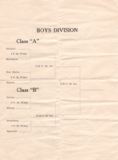 |
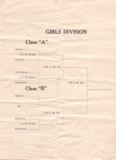 |
 |
| Cover | Boys | Girls | Ads |
The Boone County Basketball Tournament. Date?
![]()
James Duvall's Baptist History Homepage has a large collection of the histories
of virtually ever Baptist Church that was
ever in Boone County, plus biographies
of many of the notable figures of those churches. Check out his site
here.
![]()
There are seven other Boone Counties in the USA:
| Boone County, Arkansas | Boone County, Missouri | Boone County, Illinois |
| Boone County, Indiana | Boone County, Nebraska | Boone County, Iowa |
| Boone County, West Virginia | ||
![]()
The story of the lynching of Charles Dickson in Boone County, in 1884, here.
The story of the lynching of Willis Jackson in Boone County, in 1879, here and here.
In 1894, the Cincinnati Enquirer cites a record of lynching going on over in Boone County in 1894. Story here.
For the attempted rape of a Walton girl, William Scales was taken from the Burlington jail to
Florence to be hung. Judge Lynch presiding. The story's here.
A second account of the Scales lynching is here.
The Enquirer's summary of Boone hangings is here.
 The New Northwest, September 11, 1879 |
Sacramento Daily Union, September 6, 1879 |
 Terre Haute Daily Union, March 9, 1858 |
The Aspen (CO) Daily Chronicle, June 4, 1891 |
 The Middlebury Register, May 9, 1884 |
Weekly Argus, January 2, 1875 |
![]()

| Phone numbers used to have letters in them? Here. |
Boone towns connected by phones in 1900. | By 1906 telephone access became amazing. Well, they thought so. |
| In 1903 they didn't yet have phone books. They had call cards. Here's the Boone County phone card. Note that towns as well as people have numbers. | ||
| “The Cincinnati and Suburban Telephone Company yesterday began making connections with the Boone County (Ky.) Telephone Company, which has recently changed to the Bell Telephone Company System.” from the Cincinnati Enquirer, May 6, 1903 | ||
| William Fitzgerald's Place Names in Boone County is here. (pdf) |
Chart of all the Baptist Churches in the North Bend Association, 1893. |
Robert Ellis' Boone County - Boom County, from 1955, is here. (pdf) |
Judge acquits murderer in Boone |
Boone County Officials, 1847, here. |
A gas balloon travels to Florence in 1877. Story's here. |
| Boone County sites placed on the National Register of Historical Places are at this site. | Who went to the penitentiary from Boone County from 1808 to 1830, and why? There's a list, here. | |
Boone County described as “too rural” in a 1932 police study. |
Kathryn Boyd has written a piece on Price Pike and its people, which is here. (pdf) | In 1969, Edna Talbott Whitley compiled a list of Cabinetmakers in Kentucky. The Boone County portion of that list is here. |
| Boone County born novelist Gertrude King Tufts. | Boone County in the 1937 flood, here and here. | Successful new crop in Boone County in 1937? Grapes. |
| Bonds of Boone County Tavern Keepers from 1869 - 1870 are listed here. | A List of the Boone County Historical Markers is at this site. |
A status report from the Superintendent of Schools in Boone County from 1900 is here. And 1907 is here. |
| There were 41 one room schools in Boone County in 1897. The full list is here. A summary from 1896 is here. | The last one-room school in Boone County closes. | Boone County school census, 1899. Essentially a list of all the one-room schools. |
| “Dr. Baker spent Sunday in Boone county. The friends he visited live eight miles from the railroads, and to take a train from this city it is necessary to ride a distance in a buggy. “They are the roughest roads I ever saw,’ said Dr. Baker yesterday afternoon. ‘I got up this morning at 5 o’clock and drove over to the station in a buckboard. Those roads up there in that part of the country are nothing but places where people walk by agreement. Generally they are rocks and boulders, but now and then there are depressions, which do the work just as effectively. They don’t make springs on their buggies up there, because springs will break.” From the Courier-Journal, August 25, 1903 | ||
| An Account of the First Boone Countians: An Account of the Prehistory of Boone County is here. (pdf) | How Bullock Pen got its name, here. | Boone County Historical Society's 1958 booklet of essays on Florence histories is here. (pdf) |
You can read a proposal to build the Covington, Big Bone, and Carrollton Railroad, here. |
In 1919, there was a farm census, counting livestock, crops and farms. Boone County's is here. |
A List of Boone County Cemeteries is at this site. You will also want to look at this site. |
| A list of the first automobiles registered for Boone County in 1910 is here. | Random Boone County News, circa 1813, is here. | Read about glaciations in Boone County, here. |
Visit Philip Naff's In The Region, a site devoted to Boone County History and Genealogy, here. |
Boone County Cemetery Records are at this site. |
D. B. Wallace wrote a short description of Boone County in 1917. It's here. (pdf) |
| From 1908 comes M. C. Norman's history and description of Boone County. Here. | Fattest man in the state of Kentucky dies in Bullitsville, story here. | The disastrous ice gorges on the Ohio River in 1917, here. |
| Boone County's Catherine Appel led one very interesting life. Read about her here. | “Several hundred white and black laborers have passed through town this week on their way to work on the Cincinnati Southern railroad, in Grant county; about two hundred carts, with mules and drivers, also passed. It looked very much like ‘war times’ to see the long procession of carts and wagons.” Courier-Journal, June 21,1875, quoting the Boone County Journal. | |
| Boone County deploys a small army of game wardens to control influx in Hoosiers hunting in Boone County in 1903. Story here. | Bank assets in 1907 are concentrated in Walton and Burlington. More banks are in the river towns than not. Details. | Directions for how, in 1898, to go from Cincinnati to Burlington, and back, on a bicycle. Here. Out thru Florence/Limaburg; back thru Hebron/Constance |
| Evidently, in 1907 hunting with ferrets was also a problem. | The Dinsmore House's site is here. | An account of the explosion of the steamer Fanny Fern at North Bend in 1858. |
| The Louisville Post's Ralph Coghlan writes a description of Boone County in 1923. Here. | Agnes Chandler Kenney was interviewed about her days teaching in a one-room school in Boone county from 1918-1928. Read it here. (pdf) | The Kentucky Opportunities Department of Associated Industries of Kentucky this description of Boone County in 1927. |
| Boone County Historic Preservation Review Board's Boone County Heritage site is here. | Ann Lutes' History of Florence is here. (pdf) | Ann Lutes' Brief History of Boone County is here. (pdf) |
| A site dedicated to the bridges of Boone County is here. |
In 1914, here’s what the L&N’s Industrial Freight and Shipper’s Guide had to say about Verona and Walton. | Around 1951, eighty year old Mabel G. Sayre wrote her autobiography, My Life In Boone County, More Than Sixty-Three Years. You can read it here. (pdf) |
![]()
 |
 |
| Daily Evansville Journal, September 17, 1862 | The Ohio Statesman, September 16, 1862 |
Plymouth (IN) Weekly Democrat, September 16, 1862 |
|
 |
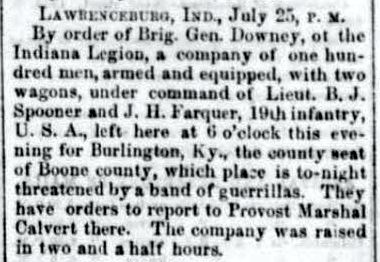 |
| Daily Ohio Statesman, September 25, 1862 | Nashville (TN) Daily Union, July 27, 1862 |
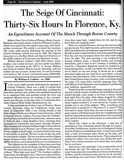 |
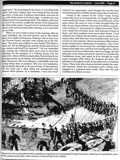 |
|
| from the Kentucky Explorer, June, 2009 | ||
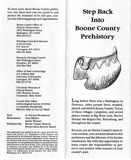 |
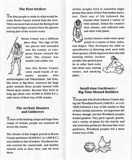 |
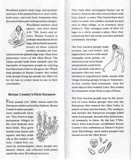 |
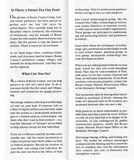 |
| Step Back into Boone Pre-History | |||
In 1871, Taylorsport's Parlor Grove baseball team played the Arctic Club of Petersburg on the Hebron grounds. 41-38.
| Prof. A. M. Yealey writes on Civil War events in Boone County, here. (pdf) His History of Boone County is here. (pdf) | Short biography of Boone County's Brigadier General E. R. S. Canby can be found here. (pdf) | 150 mounted Guerillas, in 1861, mostly from Boone County, head south. It doesn't go well. Details. |
| Confederates retreat. | “Col
. Mark Mundy, accompanied by a considerable force of men, left Camp King on Monday for Burlington, in Boone county, which is
nine miles from Florence. The object of Col. Mundy’s expedition is to break up a gang of Secessionists in the neighborhood of
Burlington who have lately been threatening to attack a party of Union soldiers stationed there, and intended for Col. M.’s
regiment. No intelligence has been received from the expedition as yet.” from the Courier-Journal, November 13, 1861, reprinting an item from the Cincinnati Enquirer |
|
| News from a camp near Walton. | ||
| An 1862 notice of Civil War activity near Florence is here. | A newspaper article from 1861 about possible Civil War trouble in Florence. Here. (pdf) | A soldier with the Union 103rd camps at Snow's Pond in 1862. Read his letter to the newspaper here. More about the skirmish at Snow's Pond, at Kensington, September 25, 1862 between Richwood and Walton is at this site., |
| Boone County described as a “hotbed of treason” in 1862 | Lawrenceburg troops sent to guard Burlington, 1862. | 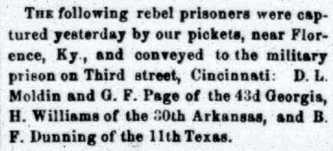 Cincinnati Daily Gazette, September 18, 1862 |
| Additional Civil War items from Northern Kentucky are at our Civil War page. | ||
![]()
Kentucky Progress Magazine named R. B. Huey as one of
12 Master Farmers
in the state of Kentucky in January, 1931.
![]()
Steamer Thomas Sherlock at Parlor Grove
|
Before King's Island, before Coney Island, and even before the Ludlow Lagoon, there was Boone County's Parlor Grove Amusement Park. Read all about it, here. |
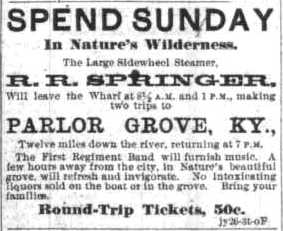
Cincinnati Commercial Gazette, July 28, 1883

Cincinnati Commercial Tribune, May 11, 1873
![]()
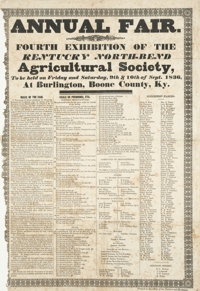 |
| 1836 |

An ad for the 1870 Fair An ad for the 1877 Fair |
 |
The Boone County Fair is currently in at least it's fourth location. You can see near Kentaboo on this early Lake Atlas map at the left an early location called Fair Grounds. | |
| The Boone County Fair, circa 1915. This is the grandstand referred to below. | |||
 |
Boone County Fair, at Florence, 1907. The Florence Fair Grounds were in a triangle roughly defined by US 25, US 42, and Circle Drive (hence the street named Fair Court in that section). There was a large open arena with covered grandstands and a large 2 story bandstand in the center. There was a fair here from 1895 to 1932. | ||
 |
Boone County Harvest Home Fair was on Limaburg Road, home to the Boone County Fair before it's current location. It was here from 1935 to 1940. The fair was just a one-day affair in those years. | ||
| Renting Harvest Home was a hassle for the fair, and in 1939 and 1941, the fair was held at the Burlington School. The current fairgrounds were purchased in 1942, and the fair has been there since. The old fair grounds in Florence were finally sold off in 1944. | |||
| “The North Kentucky Agricultural Fair will be held at Florence, Boone county, on the 3rd, 4th, 5th and 6th of next month. A large attendance is expected, and ample accommodations have been made to accommodate all who go.” Louisville Daily Courier, September 21, 1855 | |||
| Mrs. Elizabeth Goodridge Nestor writes on the Old County Fairs Held in Florence, Kentucky, here. (pdf) | |||
| “The Kentucky North Bend Agricultural Society hold their annual exhibition at Florence, Boone county, Kentucky, on Tuesday and Wednesday, the 23rd and 24th of September”. The Indiana Palladium (Lawrenceburg), September 20, 1834, | |||
| Fair “resuscitated” after an absence in 1895. | The 1896 Fair | The first fair, 1833. | |
| Baseball tournament at the fairgrounds, 1866. | Knights on caparisoned steeds at the fairgrounds, 1866. | ||
| In 1835, the “third annual” fair was in Burlington | The 1859 Fair. Prizewinners, 1859 | The 1860 Fair | A review of the 1869 Fair. |
| Fifteen alligators to be at the fair in 1939. | |||
| The 1873 Fair. | There was an 1883 fair at Parlor Grove. | The 1892 Fair | “the Famous Florence Fair,” 1914. |

Cincinnati Commercial Tribune, August 27, 1914
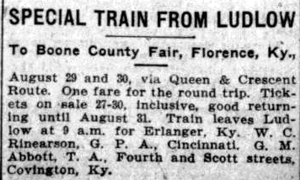 |
 |
 |
| Cincinnati Commercial Tribune, August 25, 1902 | Blue Grass Blade, September 3, 1905 | Frankfort Roundabout, August 24, 1901 |
| For many years, you took a train to get to the fair. Woodside? Think Elsmere. | ||
At the Burlington Fairgrounds
From a Facebook post by Boone County Borderlands Archive and History Center
Images from the Fair, August 29, 1931
Lionel Gray, Rocking Chair Champion
Findlay (Ohio) Republican Courier, September 11, 1923
![]()
| This list of Boone County deaths from
WWII is from the National Archives.
There's a key to what the various abbreviations mean here, and the actual list is here. |
|
| The World War I list is here. | |
| Detailed Presidential voting statistics from Boone County are here. | A short Boone County history written for the WPA is here. (pdf). |
The Boone County Roots Web site is here. |
The Biography section of Roots Web for Boone County Citizens is here. |
![]()
Kenny Price sings Boone County Sheriff
Price was a successful country music singer from Florence.
He lived on Garden Road for a while, but later moved to LeCresta.
He bought his parents a house on Valley Drive
Read more about him on his Wikipedia page,
here.
![]()
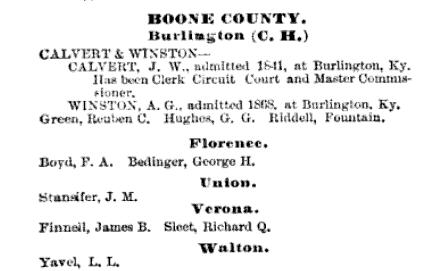
from Trow's Legal Directory of Lawyers in the United States, 1875
![]()
C. 1928, the Kentucky Opportunities
Department published a fact sheet about Boone
County for potential businesses that might be interested. You can read it
here.
(pdf)
![]()
“Abner Gaines was the contractor for carrying mail from Georgetown to Cincinnati, Ohio,
three times a week
and back, in four-horse post coaches, from 1st January, 1828 to 31st December, 1831, at a compensation of one
thousand
seven hundred and ninety dollars per annum.
“On the 8th October, 1831, he
was allowed for carrying three additional mails a week between Gaines' cross roads [Walton] and
Burlington, twelve miles, from 1st
January, 1828, to 31st December, 1831 at the annual rate of $144.40.”
both from the Public
Documents of the 23rd Congress, December 1, 1834
But in 1835, the mail skipped over Gaines Cross Roads.
![]()
“When people discovered last Thursday morning that about three inches of snow had fallen during
the night before there was a great surprise.”
Boone County Recorder, May 6, 1908.
![]()
|
“Petersburg, Ky., - The Boone County Telephone Company will extend its lines to Belleview and Rabbit Hash, which connection will be made with the Southern Indiana Association by cable under the Ohio river.”The American Telephone Journal, 1902 |
![]()
![]()
Can you name the fifty-five (55!) town
names in Boone
County that have had US post offices? That list is here.
There's a list of the 14 Boone County post offices of 1885, listed by the amount of revenue each generated. Here.
A history (pdf) of Boone County post offices was written for the WPA by Robert Rennick
| Here's a curious collection of documents from the 1860-1940's, from the post office, with town names, maps, and name changes. You really should start here, and they might make more sense to you. All are pdf's. | |||
| Beaver | Berkshire | ||
| Big Bone | Burlington | Constance | Devon/Crescent |
| East Bend | Florence | Francesville | Grant |
| Grubbs | Gunpowder | Hamilton | Hebron |
| Hume | Landing/Normansville | Limaburg | Petersburg |
| Rabbit Hash | Richwood | Taylorsport | Union |
| Utzinger/Idlewild | Verona | Walton | Weneeda |
![]()
Additional Links that apply to all of
Northern Kentucky Views, and may or may not
be related to Boone County, are on the main Links & Miscellany page,
here.
![]()


